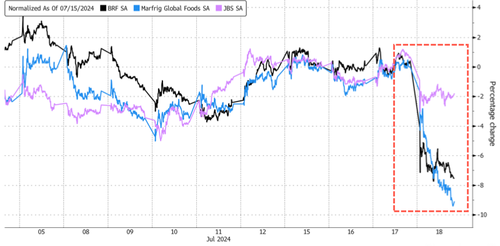
As the bird flu ravages commercial farms across the US, with nine reported human cases so far, a new outbreak of Newcastle disease in Brazil has forced the South American country to suspend poultry exports.
According to Bloomberg, Brazil, the world's largest chicken supplier, confirmed the Newcastle virus was detected at a poultry farm in Rio Grande do Sul state. Birds on the farm have been culled to prevent further transmission of the virus.
A notice issued by the country's agriculture ministry said the southern state has halted exports of chicken, eggs, and other poultry-based products to Argentina, the European Union, China, India, South Africa, and Mexico.
The highly transmissible virus, which doesn't affect humans, sent shares of major producers in the country tumbling since the news broke Thursday. Shares of BRF SA dropped by 7.5%, Marfrig Global Foods SA slid 9%, and JBS SA fell about 2%.
Here's more from Bloomberg on the detection of the virus:
Brazil's Agriculture Minister Carlos Favaro said one chicken tested positive for Newcastle disease, which attacks the respiratory, nervous and digestive systems. The collapse of a roof in a coop after a storm may have exposed the chicken to the virus, which can be found in infected wild bird feces, he told reporters on Thursday.
"This seems to be an isolated case," Favaro said. "There's no sign of sick animals in the area, let alone in the region."
Newcastle disease was last found in backyard birds in Brazil in 2006. There have been no previous reports of the illness in commercial flocks in the country, according to data from the World Organisation for Animal Health.
This is yet another reminder that the global food supply chain is fragile. And at a moment's notice, any government could halt food shipments, leading to significant price volatility. In these uncertain times, it's wise to source locally or, if you haven't already, consider purchasing farmland.
Stop relying on megacorps; source locally.
As the bird flu ravages commercial farms across the US, with nine reported human cases so far, a new outbreak of Newcastle disease in Brazil has forced the South American country to suspend poultry exports.
According to Bloomberg, Brazil, the world’s largest chicken supplier, confirmed the Newcastle virus was detected at a poultry farm in Rio Grande do Sul state. Birds on the farm have been culled to prevent further transmission of the virus.
A notice issued by the country’s agriculture ministry said the southern state has halted exports of chicken, eggs, and other poultry-based products to Argentina, the European Union, China, India, South Africa, and Mexico.
The highly transmissible virus, which doesn’t affect humans, sent shares of major producers in the country tumbling since the news broke Thursday. Shares of BRF SA dropped by 7.5%, Marfrig Global Foods SA slid 9%, and JBS SA fell about 2%.
Here’s more from Bloomberg on the detection of the virus:
Brazil’s Agriculture Minister Carlos Favaro said one chicken tested positive for Newcastle disease, which attacks the respiratory, nervous and digestive systems. The collapse of a roof in a coop after a storm may have exposed the chicken to the virus, which can be found in infected wild bird feces, he told reporters on Thursday.
“This seems to be an isolated case,” Favaro said. “There’s no sign of sick animals in the area, let alone in the region.”
Newcastle disease was last found in backyard birds in Brazil in 2006. There have been no previous reports of the illness in commercial flocks in the country, according to data from the World Organisation for Animal Health.
This is yet another reminder that the global food supply chain is fragile. And at a moment’s notice, any government could halt food shipments, leading to significant price volatility. In these uncertain times, it’s wise to source locally or, if you haven’t already, consider purchasing farmland.
Stop relying on megacorps; source locally.
Loading…





